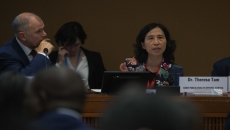Restaurants struggling to survive during the COVID-19 crisis have turned to take-out and delivery, but the fees charged by food-delivery companies are eating away their bottom line, some operators say. Physical distancing measures have decimated dine-in service, which accounts for most industry revenue, said Mark von Schellwitz, a vice-president of the non-profit Restaurants Canada.
Margins are typically less than five per cent at the best of times, he said, and delivery platforms can take up to 30 per cent commission.
Companies including Uber Eats, DoorDash and SkipTheDishes say they're offering restaurants various supports and the opportunity to keep serving customers, while maintaining their own operations.
"We think they need to sharpen their pencils to reduce the fees ... or an increasing number of members will be asking us to implement some sort of a fee cap," said von Schellwitz, pointing to the temporary 15 per cent cap on commissions established in San Francisco this month.
Terrence Feng owns and operates Kin Kao, a Thai restaurant along Vancouver's Commercial Drive that previously generated about 15 per cent of its revenue with take-out and 10 to 12 per cent through delivery.
Now, delivery accounts for 50 to 60 per cent and the rest is take-out, said Feng.
"We were basically at break even, if we're lucky, given the current commission rates."
Feng said profits have improved in the last couple of weeks because DoorDash cut its commission fees in half for local restaurants on April 13. The commission rate can vary by restaurant, and Feng said Kin Kao now pays 14 per cent.
DoorDash said its investment of up to $100 million to cut the fees will continue through the end of May.
Kin Kao is still paying 28 per cent commission on sales through Uber Eats, said Feng.
Uber said in a statement that it's supporting restaurants in a sustainable manner by waiving delivery fees for customers, thereby generating more orders. It said commission fees help cover operating costs and to reduce them would make it difficult to maintain a safe and reliable platform.
Both Uber and DoorDash are also waiving commission fees for orders placed through the app that are picked up in person.
Gino Herring, the general manager of Vancouver Italian restaurant Sprezzatura, said they had never used food delivery platforms before the pandemic, but quickly adopted Uber Eats, DoorDash and SkipTheDishes.
Dine-in service accounted for 90 per cent of the restaurant's revenue, said Herring, and now it's about 80 per cent from delivery.
Although he's pleased with sales, Herring said the companies' fees are "aggressive" and local restaurants aren't in a position to negotiate.
"It's a bit predatory, but we operate at the behest of those apps," he said.
SkipTheDishes is Canada's largest food delivery network, headquartered in Winnipeg. CEO Kevin Edwards said the company has a vested interest in ensuring its vendors make it through the pandemic.
"It certainly doesn't do Skip any good to have any restaurants struggling," he said.
The company initially offered restaurants a 15 per cent rebate on commissions before increasing the rebate to 25 per cent through the end of May. It's also offering reduced fees for restaurants that use their own delivery staff when an order is made through its app.
Edwards said his company will think about how it can enhance its support for local vendors, but he's not sure what form it would take, and the company also has to ensure its own viability.
"Our net revenue is not nearly what people believe it to be and taking 25 per cent and applying it to a rebate obviously changes that," he said.
Foodora announced Monday that it's closing Canadian operations next month, saying Canada is a highly saturated market for online food delivery and the company was unable to reach a level of profitability sustainable enough to continue operations.
Feng said local restaurants that don't have any other way to get food to customers are "handcuffed" to the delivery apps, while struggling to turn a profit during the pandemic.
"If everybody stood up in the industry and said, 'You know what, that's too much' ... then I think they'd be way more willing to play ball. But when they know that 95 per cent of their clients can't do anything about it, they can flex their muscle a little big more, right?"
Edmonton chef Paul Shufelt avoided delivery apps when he opened The Workshop Eatery, opting for an in-house delivery system instead.
In early April, Shufelt posted a video on Facebook breaking down the costs of running a restaurant and how commission fees can affect the bottom line. It's since garnered more than 586,000 views and Shufelt said he's heard from hundreds of restaurant operators who are struggling with the fees.
Shufelt said for many restaurants, reliance on delivery is likely here to stay, even after physical distancing restrictions are loosened.
"I think that's going to make things really hard for restaurant owners who already barely make enough to keep the doors open."





